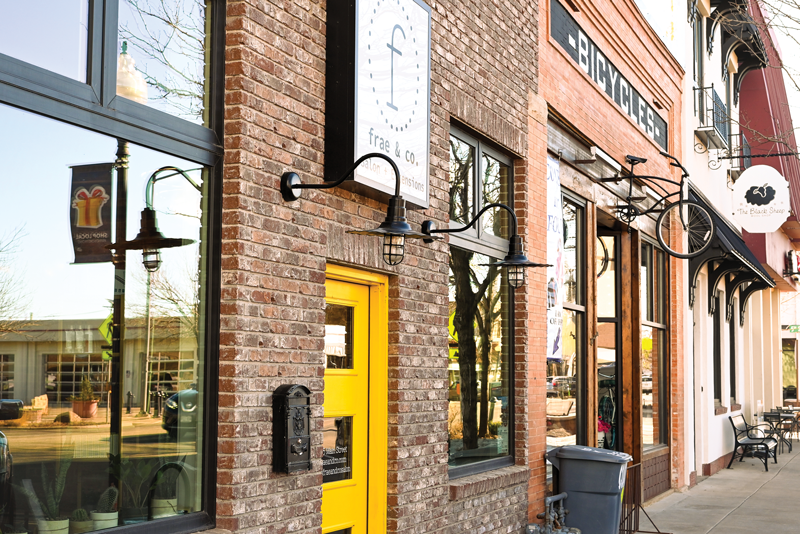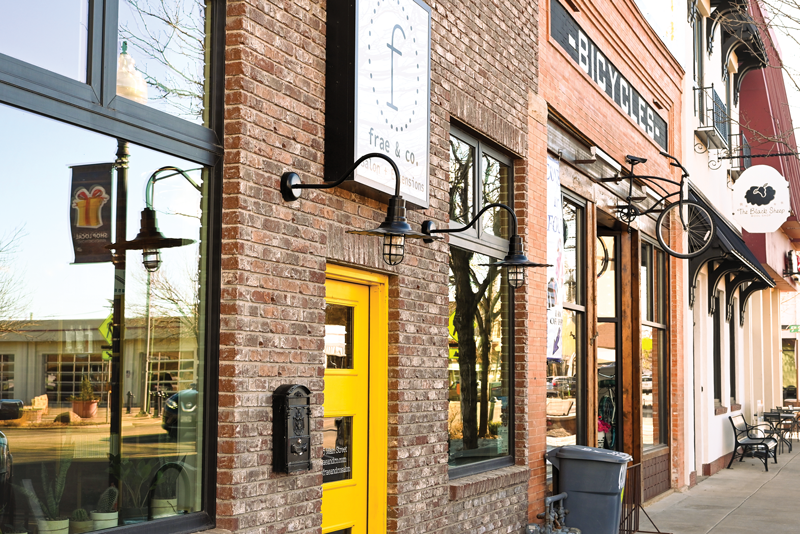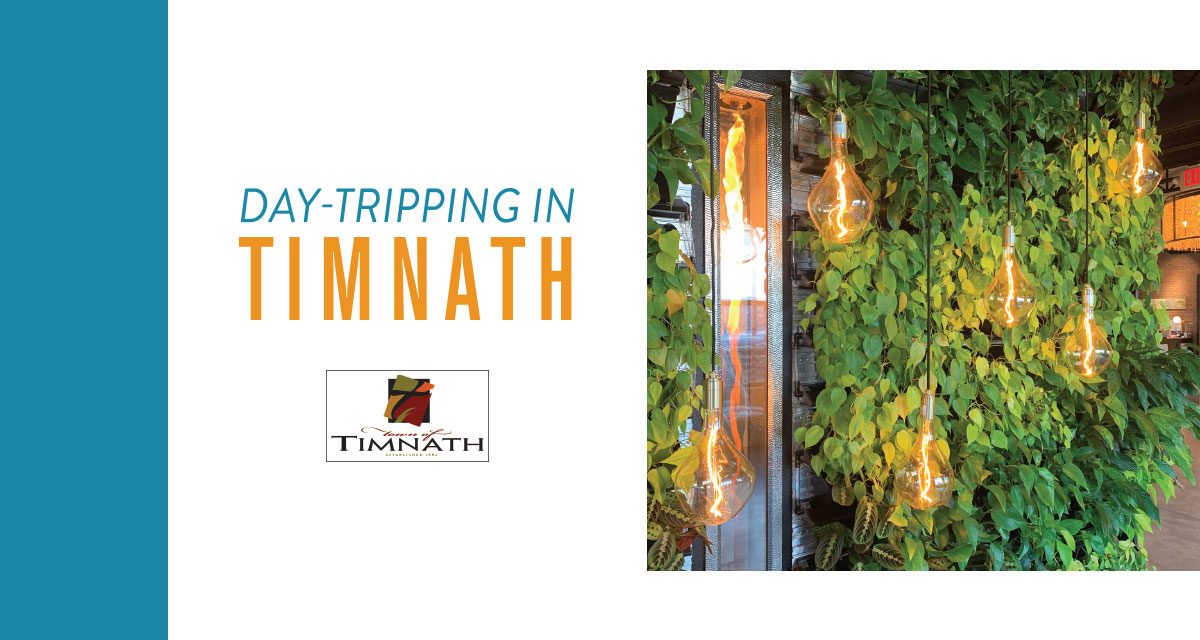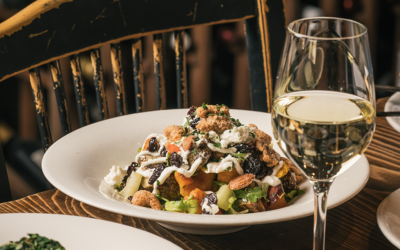In Michelle Vance’s temporary office for the Windsor Downtown Development Authority (DDA), a giant window allows her to peer out to Main Street and, more importantly, wave at anyone who walks by.
In December, the DDA hired her away from the Windsor Chamber of Commerce, and though she has many things to do, the main mission was pretty clear: Smooth things over between those who voted Yes on 200 and the comparative few who voted No. Vance, right now, is one of the few people capable of that, possibly the only one, since a Jan. 24 special election that made the so-called backlots a permanent parking lot in downtown Windsor. That vote essentially, for a year anyway, shut down plans for bringing in retail and an apartment complex to the central business district.
Backlots is a big chunk of prime real estate, located along the train tracks between 4th and 7th streets just north of Main Street and south of Windsor Lake. It’s also the last viable piece in the heart of downtown: Vance refers to the area as downtown’s “final frontier.” It could also cost the town millions, leaders say, instead of bringing in millions, to pave and manage a parking lot just after the town will add 400 spaces by this summer.
The hiring of a popular chamber director who is friends with people on both sides of the issue is an admission by the DDA that they didn’t listen enough, and that having an outside consulting firm as a director, with no office and no window, was a mistake.

“We need to do a better job of communicating,” says Dan Stauss, chairman of the DDA and owner of Memory Lane Antiques, next door to Vance’s digs. “That’s why we hired Michelle Vance. She’s a bridge builder. I saw the need to do this two years ago, so when I saw the opportunity to hire someone dynamic, we took it. I hope it’s not too late.”
Leaders of the fight to make the backlots a permanent parking lot hint that it might be.
Town leaders, opponents say, including the town board and the DDA, had a vision of what downtown should be and didn’t seem to care that residents had some major misgivings about it. They have now paid for that hubris, they say.
Town Manager Shane Hale agrees that this disagreement goes beyond parking. This is a fight over downtown Windsor’s future.
“It’s more about the community defining itself on what it is,” Hale says, “and what it wants to become.”
Everyone also agrees that more communication, either from the DDA or the town, might have prevented things from getting this out of hand and going to a vote. But there was no real communication because no one was sitting in an office with a big glass window.
Marissa Banninga, a resident of Windsor, started the petition because she thought she had no other choice. Residents voted for parking and rejected plans for the apartment complex and other development by a huge margin, 7,253 to 1,674.
Now Vance is talking compromise.
“There’s a disconnect when you don’t have a full-time director,” says Vance, who saw the problems brewing as the chamber director but really couldn’t interfere. “The DDA didn’t know it was as serious as it was. Now we need to communicate, communicate, communicate.”
But Banninga and others wonder why they should listen.
“It’s now a different conversation than what would have happened six months ago,” Banninga says. “That’s the crazy thing in all this. It was an overwhelming vote. It’s obvious to me the town doesn’t want this. At what point do we say we aren’t the ones to compromise anymore? I could compromise before this, but now, how do we compromise? I don’t know.”
Clearly, Vance has her work cut out for her, something that will take more than a lot of friendly waves to smooth over.

Saying no
Banninga, who lives downtown on Walnut Street just a couple blocks from the business district, asked to serve on a parking committee started by the town in 2021 to solve what many residents perceive to be the area’s biggest problem. She grew up in Windsor and remembers when the town had 5,000 people, about 30,000 less than what it is now. The committee of residents and business owners met four times, she says, and their solutions were dismissed and replaced with thoughts of a possible parking area next to her house.
That, she says, was just the beginning.
The town then wanted to increase building heights to a 65-foot limit. The move was extremely unpopular, and not just because residents and business owners saw it as preparation for allowing relatively high-rise apartments to move in. Some were concerned about a building blocking their views of Windsor Lake. Others said the move gave an unfair advantage to new businesses because they could build more space on a single lot. And others wondered why the town leaders seemed to support a move that would make the parking problems much worse when their current concerns about traffic and parking weren’t being addressed.
“It was standing-room-only,” says Jason Shaeffer, owner and chef of Chimney Park, an elegant restaurant and downtown staple since 2007, “and they voted it through anyway. It showed some serious disconnect.”
This may sound to outsiders like another “Not In My Backyard” fight against development, but Banninga, Shaeffer and others saw their downtown, a place they loved and saw as unique to Northern Colorado, being drastically altered. There was little doubt that apartments would change the look, if not the culture, and could add to the parking problems. They decided to stop it.
Banninga started a petition with the help of her husband, Cameron, a Fort Collins attorney. Banninga says Windsor could continue to have the same quaint feel like Breckenridge instead of being another Old Town Fort Collins.
“I think we can do that well here,” she says. “The park is SO wonderful for entertainment and activities and I love it, and I can’t imagine all that continuing if you don’t have adequate parking.”
Is parking a problem?
Windsor’s DDA formed in 2011 and purchased the backlots property to encourage development. Downtowns weren’t as hip then as they are now, and Windsor’s was dying or dormant, depending on your point of view.
Shaeffer was on the DDA at the time, and he says the backlots, just behind his Chimney Park restaurant, were intended to be parking all along. But that wasn’t the goal during most of the DDA’s ownership. The DDA had some interest and worked with a few developers, but instead downtown grew around it, and residents used the backlots as an unofficial parking lot.
There were times the town clearly needed it, especially during events like the Windsor Harvest Festival or the summer concerts at Boardwalk Park. But just how much downtown needs the extra parking throughout the year might be the crux of the fight, and the perception that there isn’t enough parking, true or not, helped the vote block any development on the backlots, including apartments.
“We needed to address the parking first,” Shaeffer says.
But Windsor did address it, Hale says, and it started to address it a couple years before the vote. The town did a parking study in 2021, with Banninga’s committee part of the process, and the plan that came out as a result did recommend actions that added parking, including 140 on-street spaces on the 6th Street Windsor Lake Corridor in 2022. This spring, probably by Memorial Day, new parking will add 121 spaces, and downtown businesses’ agreement to share spaces will add more than 100.
This is ample parking, Hale says. The problem, though, and Hale acknowledges this, is those lots aren’t as convenient, or as well known, as the backlots, and parking along the 300 block of Main Street is already at capacity during the weekends or other busy times. The backlots are close enough to absorb any parking needs along that area.
Shaeffer’s Chimney Park, for instance, needs those spaces. Banninga calls the backlots “the most used parking lot in Windsor.”
“Some of my guests told me that they were going to come here after the concert, but they saw there was no parking available and just drove away,” Shaeffer says. “They told me, ‘We figured you were booked.’ And my place was half empty.”
If you think Shaeffer is just concerned about his business, this was an argument used by many others, including Banninga.
“The location of the parking matters,” she says. “Not just having more parking is good enough. Location is more important.”
Hale acknowledges this, but he doesn’t think building a parking lot on prime commercial real estate makes any sense for downtown, especially when it boils down to convenience. It’s a lot with “infinite potential,” he says, and, as Vance says, it’s really the last piece of land to have that kind of potential. It’s even possible that downtown needs that development to thrive.
Yes, parking can be a problem when major events are occurring, but should Windsor pave over a lot worth millions so people don’t have to walk 10 minutes to get to a Thursday night concert?
This is another major point of contention, and it’s why many view this as a disagreement over downtown’s future more than a battle over parking.
“Part of what I took away from the vote is I see downtown as the heartbeat, but others don’t agree,” Hale says, “or maybe some see it as vibrant enough. We have some great restaurant choices, but I think we could have a few more. We don’t have a vibrant downtown. Every time you look at it, we have a lot more revenue to capture.”
Does Windsor’s downtown need foot traffic?
Hale and Stauss believe downtown needs to grow. Shaeffer and even Banninga do not disagree. But the sides do disagree on how downtown grows and, essentially, what downtown should look like in five years.
Shaeffer says there was room for retail and keeping some of the parking spaces, and it’s possible that the group would have accepted that plan. He and others were taken aback when he heard about plans for an apartment complex with 200 units. That’s not retail, he says. That’s residential.
Hale gets frustrated when he hears about specific plans for apartments, as there was no plan turned into the city, and it’s hard to refute rumors when he doesn’t have anything to present as an alternative. But he and Stauss don’t deny that residential units were part of the plan: They just said those plans may not have equaled the rumors. Tribe Development, the company selected to handle the backlots, made it clear apartments were a part of the plan, as the lead photo of a presentation about the project on Tribe’s website shows a drawing of several buildings by Windsor Lake.
Regardless of the details, downtown does need residential units, Hale says.
“We love to see the restaurants, but you need foot traffic,” Hale says. “We need people downtown to make all these places viable.”
Banninga and others think an apartment complex doesn’t fit and even seems like a desperate move for an area that doesn’t need it. Banninga grew up in Windsor, and she not only loves the downtown dearly, she believes in it.
“I do feel like people come downtown for a reason,” she says. “They want to go to the ice cream shop or to the lake. It’s a different type of draw. It’s wonderful how much more vibrant it is. I don’t think we have a struggling downtown anymore.”
In fact, sometimes progress has negative consequences. Windsor Mill Tavern is a shining example of Windsor’s downtown resurgence, but it also increased the demand for parking. Residents nearby have dealt with parking by their homes and beer cans in their yards as a result. Banninga has a 3-year-old, and that makes her uneasy, though she also said she hasn’t had many problems: Her home isn’t close to the Mill.
“I have a quiet neighborhood,” she says, “and I would like to keep it that way.”
But what makes Stauss uneasy is the perception that downtown is thriving. He’s lived in Windsor for 39 years and has owned his antique business for 30. It’s the fifth oldest business in Windsor. He remembers the dog days of downtown.
“We had 12 vacancies,” he says. “It was dead. There’s a belief that it can’t happen again. It can easily happen again.”
He even says businesses are operating “on a shoestring” because of property taxes—his increased by 62 percent, and he owns four buildings—and the only way to combat that is to draw more customers. The lunch hour, however, tends to be quiet and bad weather tends to hurt downtown more than other places. He supported plans for apartments because it would bring the foot traffic he believes downtown needs.
“You’re putting in residents who would spend money down here when it was snowing,” Stauss says. “If we don’t have new amenities and new restaurants, it will die again.”
Stauss is especially concerned about the new Future Legends Sports Complex, which he says will compete for attention. Indeed, the 118-acre complex will bring several restaurants and some shopping in addition to fields and stadiums. This concerns Hale, too, even though he is excited about the boon the new complex will bring to Windsor. His argument is that downtown is where a community thrives.
“Downtown is where you’re more likely to see someone you know,” Hale says. “The more choices we have here, the more likely it is we will see people here. It’s deeper than just a place. That sense of community is what keeps people in Windsor. It’s hard to feel like any community is thriving if your downtown doesn’t have a pulse.”
Vance echoes this because it’s part of her job and because she is worried about the new complex as well as more established places such as Centerra.
“There will be a giant sucking sound that you’ll hear from those places,” she says.
And yet Shaeffer, who has as much of a vested interest in downtown as anyone with Chimney Park and Hearth Restaurant and Pub, welcomes the new sports complex. He believes downtown will benefit from it, as long as it has the parking to handle the traffic.
“We have a lake, a brewery, several restaurants,” he says. “I feel like when you have a day off from the games, you’ll want to spend some time somewhere else. It will enhance and add to downtown.”
Reconciliation or revolt?
“If someone took a million dollars of your land…” Vance says, without finishing the thought.
After considering suing, Vance said in a March 20 statement that the DDA decided not to go that route. Instead, the DDA hopes to present alternative plans to the public, which may involve developing smaller pieces over several years.
The land is too valuable, both in monetary value and for the future. “If you don’t develop,” she says, “you die.”
As proof, she points to a substantial increase in sales tax since Betta Gumbo opened in the 500 block of Main Street.
“It works,” Vance says.
The larger issue is when there’s no more land to develop, the price of it goes up, something Stauss already noticed with the substantial increases in his property tax.
“It could get so expensive to re-develop,” Vance says. “Businesses may not be able to afford rent.”
“This was not a close vote,” Banninga says. “This is not something the town wants.”
The vote created an ordinance, and ordinances can be changed after one year. But the Mayor has already said publicly that it’s a “good bet” the town board will comply with the residents’ vote. Hale doesn’t like the outcome, but he also doesn’t want to force the issue.
“It’s not the way this town does business,” Hale says. “A decade ago, the residents made it clear that they didn’t want pot, and it’s never come up. I don’t think the town board is going to do anything but respect the residents’ wishes.”
But what if residents agree with a new plan? Stauss says that Vance sitting in the DDA office as their director gives him hope for a compromise. He urged the consulting group to reach out several times to residents, but it didn’t happen. Vance tried to reach out after her hire in December, but by then it was too late, Banninga says, and Vance agrees.
So that is what Vance is doing now. Right now, she says, she’s on a “listening tour.”
It won’t be easy. Stauss says he was treated “terribly” on social media, including accusations of wrongdoing, and his business may have suffered as a result. But he is hopeful that Vance can help make things civil again.
“We all need to come together,” he says, “instead of bashing each other on social media. I volunteered for 13 years doing this. I love the town of Windsor. I think, at the end, you’ll find less people who want to volunteer.”
In March, Vance came up with an old idea. She calls it “what’s brewing.” Stauss remembers it years ago, when public officials, including the DDA’s first executive director, would meet with residents and let them say whatever they want. The first, on March 1, was at Windsor Lake Coffee. Vance expects those first meetings to be tense.
She’s ready for it. “Come talk to me,” she says to the residents of Windsor. “We need to listen to you.”
This is part one in a two-part series by Dan England. Next month we take a look at where Windsor is growing and the transition from a small town to a mid-sized city.







